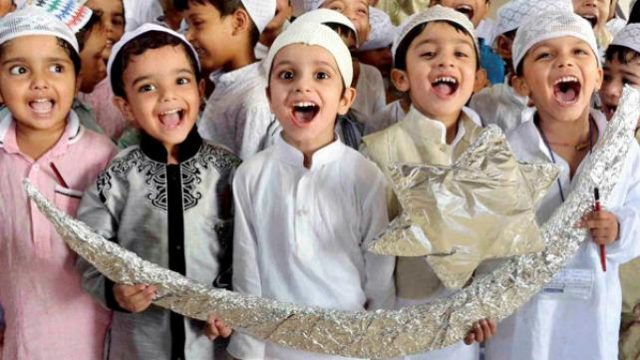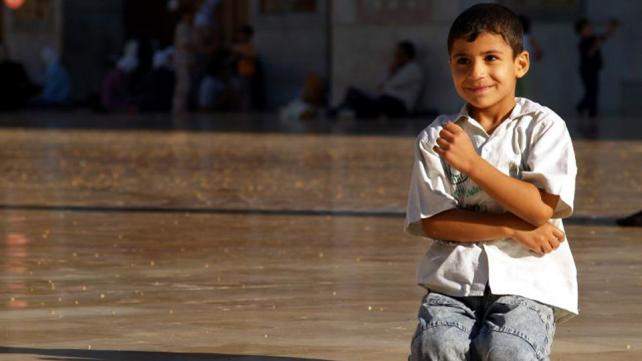Children in the Masjid: Making Space for Our Future

By Shehnaz Toorawa
Imagine a Masjid where the Imam pauses during Salah and the entire congregation waits so a toddler can finish his game. Imagine a Masjid where an Imam leads Salah while he holds a child in his arms. Imagine a Masjid where the cry of a baby changes the Imam’s intention and shortens the prayer for the entire congregation.
This was the Masjid of the Prophet Muhammad, peace and blessings be upon him. These examples are mentioned in the following Hadith:
The Messenger of Allah came out to us for one of the two later prayers [Thuhr Asr], carrying Hasan or Hussein. The Prophet then came to the front and put him down, said Takbir for the prayer and commenced praying. During the prayer, he performed a very long prostration, so I raised my head and there was the child, on the back of the Messenger of Allah, who was in prostration. I then returned to my prostration. When the Messenger of Allah had offered the prayer, the people said: “O Messenger of Allah! In the middle of your prayer, you performed prostration and lengthened it so much that we thought either something had happened or that you were receiving revelation!” He said: “Neither was the case. Actually, my grandson made me his mount, and I did not want to hurry him until he had satisfied his wish” (Reported by Nasaa’i, Ibn Asaakir, and Haakim).
The Messenger of Allah would pray holding Umaamah bint Zaynab bint Rasoolillaah. He would put her down when he prostrated, and then pick her up again when he stood up (Reported by Bukhari and Muslim)
The Prophet said: “When I stand for prayer, I intend to prolong it, but on hearing the cries of a child, I cut it short, as I dislike to trouble the child’s mother” (Reported by Bukhari).
These scenarios illustrate how natural it was for babies, toddlers, and children to be part of the Prophet’s Masjid. They show us that the Prophet understood the nature of children and cared for their needs and comfort in the mosque.
Do we witness these scenarios in our Masjids today? We see a child grabbed and told to “sit down and be quiet!” because he was running between the rows. Or we hear “sister, can you please go outside” because her baby is crying. Or we read signs that say “No children in Masjid area”.
In North America, there is a great need for our Masjids to follow the example of the Prophet (and welcome, rather than distance children. Why? For the well-being of our mothers and for the future of our children (who will run our Masjids in the future).
No Children = No Mothers
When children are not welcome in the Masjid, mothers are naturally not welcome either.
After a long day at home with noisy kids and dirty dishes, where should these mothers go to learn, socialize, give their kids a chance to run around, and get a desperate change of scenery? If not the Masjid, they may end up in malls where their children are exposed to vulgar music, scanty attire, and tempting advertisements.
Our Masjids should be the community centers that give mothers and their kids a chance to build wholesome friendships, absorb weekly reminders, and discuss their needs, whether it’s for a Muslim babysitter or a healthy recipe.
No Children = No Future
When Masjids do not welcome children, children will find other places to go. At the Masjid children often receive criticism for their noise, for how they dress, for playing basketball instead of praying Sunnah, and so on. In the schoolyard, children receive praise for their jokes, their clothes, and their athletic abilities. Where will our children prefer to spend their time?
Children thrive where they feel a sense of belonging. If we want our children to feel they belong in the Muslim community, they must feel welcome at the Masjid. Children running in the hallway or playing basketball in the parking lot are not signs of a rowdy Masjid or misbehaving children. They are signs of a flourishing community in which children are building friendships that will connect their hearts and minds to the Masjid.
Children need to develop this connection from the beginning. Once they are older and comfortable ‘hanging out’ elsewhere, it might be too late to bring the Masjid into their hearts.
Tolerating a bit of noise and play is a small sacrifice for building a positive future Muslim community.
The Nature of Children
Obviously, young children can distract worshippers during Salah. Most mothers and fathers rarely pray without the distraction of their babies, toddlers, and young children, whether at home or in the Masjid. This is the nature that Allah created in children – they overflow with energy and enthusiasm and lack self-control. Knowing their nature, the Prophet taught us how to handle children. He corrected children (and adults) with mercy and compassion. Here is an example of how the Prophet dealt with Anas bin Malik, who served him as a boy:
The Prophet sent Anas on an errand and Anas reported that “I went until I came upon children playing in the street. Then the Messenger of Allah arrived and he caught me by the back of my neck from behind. As I looked at him, I found him smiling, and he said, “Unays (Anas’s nickname), did you go where I ordered you to go?” I said, “O Messenger of Allah, yes, I am going.” Anas said further, “I served him for nine years, but I do not know that he ever said to me about anything I did, ‘why I did that, or about anything I had neglected, why I had not done that” (Reported by Muslim).
The Prophet did not scold Anas for forgetting his errand or for anything else in nine years.
In another example, a boy was brought to the Prophet because he threw stones at trees and stole dates.
The Prophet said, “O boy, why do you throw stones at the palm trees?” He said “To eat” The Prophet said, “Do not throw stones at the palm trees but eat what falls beneath them.” He then wiped (his hands over the boy’s) head and said, “O Allah, fill his stomach” (Reported by Abu Dawud).
Rather than a reprimand or punish, the Prophet made Dua for the boy.
Five Tips to Accommodate Children in the Masjid
A Masjid that welcomes children does not have to be a loud and unruly place. Here are five tips for dealing with children in the Masjid:
1. Correct gently
Anas bin Malik relates that “the Prophet did not use insults or bad language or curse (Reported by Bukhari).
Remember that children are sinless but adults are not. Allah does not punish children for their misbehavior but Allah does hold us accountable for how we treat children.
Our duty is to remind children gently about the etiquettes of the Masjid. We cannot force a child, or even an adult, to obey. Children of all ages will stop and listen to a person who smiles, says Salam, chats with them, and shows concern for their needs. Children will ignore, evade, and insult a person who treats them with harshness, anger, and insults.
2. Offer to help
Instead of staring at a father as he runs after his energetic toddler or a mother as she struggles to calm a quiet baby, offer to help. A polite “can I watch your son while you pray” or “would you like me to hold that diaper bag” earns Sadaqa for you and helps parents control their children
3. Conduct reminder sessions
Masjids can provide frequent friendly reminders for parents and children on the rules and manners of the Masjid.
4. Create child-friendly facilities
Ensure that the Masjid washroom has a change table to prevent stains and smells on the prayer carpets. Provide a room or barriers for nursing mothers. Keep a vacuum or broom handy for parents to clean up after their children. Place Mushafs and books away from a toddler’s reach.
5. Open a parents’ room
Offer a separate Salah room for parents with children. Fill it with used toys and scrap craft materials. Organize babysitting at times when you expect lots of kids, such as Jumah and Tarawih prayers or during lectures. Most parents are willing to pay a minimal fee for the rare opportunity to pray or listen to a lecture without their kids.
As the month of Ramadan is in full swing and Masjids swell with worshippers, let’s challenge our Masjids to welcome children with the same care, concern, and compassion as the Masjid of the Prophet.


